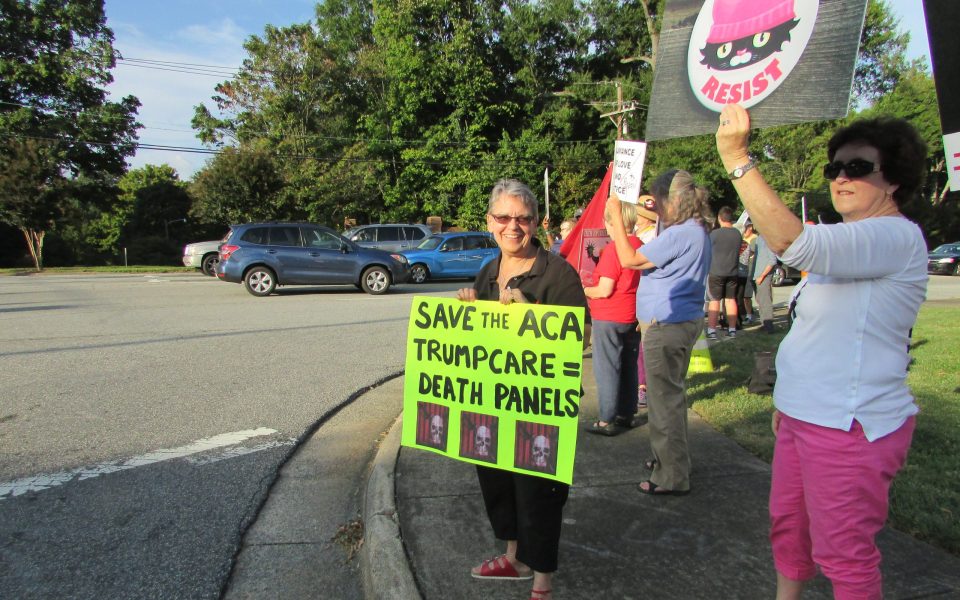Members of Indivisible and the NAACP protested the latest attempt to repeal the Affordable Care Act in Winston-Salem on Monday. While it’s not clear the two US senators from North Carolina were listening, the bill died the following day because of disunion within the Republican ranks.
Residents from Forsyth and Alamance counties gathered at a busy intersection in Winston-Salem at rush hour on Monday to protest the most recent effort to repeal the Affordable Care Act, and the next day the bill was dead.
“We’ve focused on saving the Affordable Care Act,” said Dana Courtney, a retired social worker from Graham who is a member of the Alamance County NAACP. “The Affordable Care Act isn’t perfect; it has some flaws that they need to work on. From everything I’m seeing about Trumpcare, it seems like there will be more people that will be uninsured. States will get block grants that won’t be sufficient to meet people’s needs. We want to save the provision that protects people with preexisting conditions. If they throw that out, literally people will die.”
Courtney came to Winston-Salem as part of a contingent of six people from Alamance County who are active in the NAACP and Indivisible NC-6 in response to a call from the direct action team of Indivisible Forsyth. Trina Harrison with Indivisible NC-6 said her organization decided to come to Winston-Salem because neither of the two US senators from North Carolina has an office in the 6th Congressional District. The sidewalk protest on Monday took place in front of Sen. Richard Burr’s office.
Jim Ferree, a retired US Army veteran active with Indivisible Forsyth, said that “each time they come up to repeal” the Affordable Care Act, “we come out in force.” He added that members have spoken with Burr’s staff at his office in Winston-Salem.
“Sen. Burr, in my opinion, puts party before people,” Ferree said, expressing doubt that protests and constituent calls have swayed the senator.
Burr had planned to vote for the repeal bill filed last week by Sen. Lindsey Graham of South Carolina and Sen. Bill Cassidy, an aide confirmed, while declining to comment further. Sen. Thom Tillis, the junior senator from North Carolina, also appeared to be leaning towards support for the bill. Tillis, who did not respond to a request for comment for this story, reportedly told the McClatchy news organization last week: “This bill doesn’t solve it; it just puts it on footing that is more likely to get us to a solution, through other measures that are going to require 60 votes.”
The Graham-Cassidy bill needed the support of at least 50 out of 52 Republican members of the Senate, and had looked increasingly vulnerable with Sen. John McCain of Arizona, Sen. Rand Paul of Kentucky and Sen. Susan Collins of Maine publicly withholding support. Then, on Tuesday — only four days after the bill was filed — the Senate leadership pulled the plug, avoiding a floor vote that would have resulted in defeat.
Validating the fears of the roughly 35 residents protesting the repeal effort in front of Sen. Burr’s Winston-Salem office, the Congressional Budget Office released a report on Monday evening projecting that millions of people would lose insurance if the Graham-Cassidy bill was enacted. Part of the reason for the decrease, the office reported, was that “enrollment in Medicaid would be substantially lower because of reductions in federal funding.”
Allison Layton of Winston-Salem attended the protest with her 3-year-old son, who was born with cystic fibrosis.
“He gets Medicaid through a waiver program,” Layton said. “Without Medicaid we can’t seek weekly therapies. There is school-based therapy, but we rely on Medicaid for anything outside of that…. Without Medicaid, we would go crazy in debt. My concern is that they will cut a lot of Medicaid funding.”
Nancy Forrest with the Alamance County NAACP echoed concerns that Republican efforts to repeal the Affordable Care Act will put lives at risk, while acknowledging that the current law is far from perfect.
Forrest said she and her son, who is 50, have both been diagnosed with congenital heart defects.
“We weren’t supposed to live past 30,” she said. “If we lose healthcare we’re dead because we won’t have access to doctors. I feel as though [repeal is] going to limit the coverage we can get. I’m employed now, and my job is pretty secure. My son’s case is different. He’s in much worse shape. He’s in a more tenuous job than I am.
“I’m for universal healthcare,” Forrest added. “Go, Bernie Sanders.”
While the Winston-Salem protest focused on healthcare, some people displayed signs addressing other issues like white supremacy and Russian meddling in the 2016 election.
“I’m really concerned about the Russia connection,” Forrest said. “We should have a recall connection and invalidate the election. Put as many people as possible in jail.”
Ferree, who said his primary reason for attending the protest was “to resist the white supremacist agenda,” also made an argument for universal healthcare based on his status as a military veteran.
“One of the things about healthcare that’s so hypocritical is these Republicans want to kill the Affordable Care Act,” he said. “They profess to support the veterans. That’s socialized medicine. If it’s good enough for veterans, it’s good enough for all Americans.”
Join the First Amendment Society, a membership that goes directly to funding TCB‘s newsroom.
We believe that reporting can save the world.
The TCB First Amendment Society recognizes the vital role of a free, unfettered press with a bundling of local experiences designed to build community, and unique engagements with our newsroom that will help you understand, and shape, local journalism’s critical role in uplifting the people in our cities.
All revenue goes directly into the newsroom as reporters’ salaries and freelance commissions.


Leave a Reply